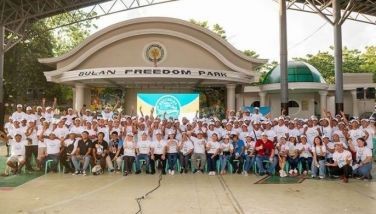A politician without ambition

The book is called “The First Filipino,” and it won first prize at the Rizal biography contest during the centennial of Rizal in 1961.
Aside from the Spanish friars, Rizal had to contend with his fellow expatriates in Spain. The best among them was Marcelo Hilario del Pilar, who used the anagram of his surname for his pseudonym, Plaridel. Guerrero said that “Del Pilar is perhaps nearest of all his generation to the modern Filipino. Modern in his concept of political activity, modern in his belief in organization, modern in his skillful and efficient use of mass propaganda methods, he was the prototype of the modern politician, lawyer, newspaperman and civic leader.”
Del Pilar, then, seemed like the prototype of the skilled, 21st-century Filipino politician: schooled, skillful in the use of social media, certain about his or her destiny as a leader of the people. He joined the colony of expatriates in Europe who were plunged into intrigues from which Rizal himself had not stood aloof. The expatriates had never got along together.
The battle line was drawn on blood. The expatriates with Spanish blood, like Antonio Regidor and Eduardo de Lete, wanted to accommodate the Spaniards; the full- blooded Filipinos were suspicious and looked at this as a betrayal. They even quarreled about who should be the editor of the expats’ newspaper. As it turned out, the editorship went to neither Lete nor Llorente nor Rizal but to Graciano López Jaena, and afterwards, to Plaridel.
Parallel to the conflict over the editorship of “España en Filipinas” was one on the expats’ organization. In 1888, they planned a new Philippine-Spanish Association to be headed by Miguel Morayta. But many of the expats didn’t like him, some because he was an excommunicated Mason, others because he was a Spaniard. So the other expats in Barcelona held their traditional New Year’s Eve reunion and organized a rival association called La Solidaridad, with Galicano Apacible as president, Graciano López, vice-president, Manuel Sta. María, secretary, Mariano Ponce, treasurer, José Ma. Panganiban, auditor, all “genuine” Filipinos.
Rizal was out of the loop, and he suspected del Pilar. In a letter to Jose Maria Basa in Hong Kong, he wrote of del Pilar: “They would be of greater service to the country if they were in the Philippines; there is nothing like staying there to be of real service, that is where education is needed, where the work must be done. It is all right for young men to come here to study but those who already are educated should return and live there. Marcelo del Pilar has already had an education and did not have to come to Europe.” Here one could see that Rizal already knew who his closest political rival would be for the leadership of the expats in Spain.
The Barcelona group was active and soon publishing their own brave newspaper with the same name as their society. Rizal then sent his congratulations: “You can count on me for everything, I want to be where you are!” Del Pilar in turn reported: “At last our little paper is out, democratic in its policy, but much more democratic in the organization of its staff. You should see how Graciano the editor writes, corrects proofs, makes up the paper, distributes the copies and even carries them to the post office, how Naning [Ponce] the business manager goes out for stories, writes, corrects proofs, addresses the copies, attends to the correspondence and also distributes the copies. I am the only good-for-nothing …”
But it was not long before the staff of the Soli were sniping at each other. “Graciano,” complained Ponce, “is losing his enthusiasm; we find it difficult to get him to write, and del Pilar has to do most of it.” When the Soli moved to Madrid, Rizal urged Ponce to move too: “You had better go to Madrid; they need you there. The newspaper does not get on well without you.” And later, when López had left the staff: “Marcelo cannot handle it by himself.”
Things only turned for the worse. As Guerrero would put it: “It was to be no less than a political duel for the leadership of the expatriates. It is difficult to believe that the conflict between Rizal and del Pilar arose merely from the petty misunderstandings to which it is generally attributed. Rizal and del Pilar were, after all, mature men of experience, sober, serious, dedicated. Yet the accepted account of their quarrel, which is almost entirely based on a letter of del Pilar to his brother-in-law, makes it appear almost childish… There was also hotly contested election on who would lead the expats. We do not have Rizal’s version except for a brief reference in a letter to Basa in Hong Kong to ‘the conspiracy which they tried to contrive against me using our friend del Pilar who unwittingly lent himself to it; I won, however. But this has left me very disgusted.’”
Clearly, del Pilar was the better politician of the two, “wary of committing himself, quick yet discreet in seizing opportunity, skilled in dissembling and in the subtle art of feeding the fire while appearing to dampen it, and much more experienced in handling human beings, the raw material of politics.”
Moreover, Rizal was too sensitive to slights, whether imagined or real, and had a low EQ. “He was ambitious beyond the reach of his influence; yet not ambitious enough to keep the leadership for which he had paid with humiliation. He wanted his leadership to be recognized and accepted as only due to his
merits and his readiness to serve; the mere hint of opposition was enough to anger and disconcert him, yet Antonio Luna had already reminded him that ‘absolute unanimity’ was an absurdity...”
Or as I keep on telling my politician-friends, you should already be thankful if you get just 50 percent of what you wish for. Politics can sometimes be a zero-sum game.
* * *
Email: danton.lodestar@gmail.com Remoto’s novel, “Riverrun,” has been published by Penguin Books.
- Latest
- Trending




























